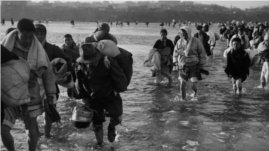Teachers' Domain - Digital Media for the Classroom and Professional Development
User: Preview

Source: Finding Your Roots: "Martha Stewart, Margaret Cho, and Sanjay Gupta"



Narrator: Margaret Cho also has gaps in her family tree because of what she knows – or doesn’t know – about why her father had to abandon his ancestral home in 1948. The reasons behind his family’s hurried escape from what’s now North Korea have long been shrouded in mystery…
HENRY LOUIS GATES, JR.: What did your father tell you about his childhood during this time?
MARGARET CHO: There was not a lot of like real like evidence of what happened through my family. So I think a lot of like the specific memories are really stifled. They didn't want to talk about that with us.
HENRY LOUIS GATES, JR.: Many older black people were like that. Trauma. You didn’t pass it on. If you didn’t talk about it, it never happened.
MARGARET CHO: Right.
HENRY LOUIS GATES, JR.: Or it would never happen again.
MARGARET CHO: Yeah.
NARRATOR: When I visited Margaret’s parents, I learned that her father is still very conflicted about the long-buried family secret that compelled his family to leave the North. In fact, he’s never revealed the reason to Margaret…
MR. CHO: I wanted to have her know what kind of world we went through.
HENRY LOUIS GATES, JR.: Um-hm.
MR. CHO: But we have been unable to show her, you know, fully. And I have many regret about that thing really.
NARRATOR: Mr. Cho’s father, Myung-Sook Cho, worked for the Japanese as a station master during their occupation of Korea, which began in 1905. According to Mr. Cho, when Japan withdrew from Korea at the end of World War II, His father was branded a traitor by North Korea’s new Communist leadership.
MR. CHO: So our family decided to move from North Korea to South Korea.
HENRY LOUIS GATES. JR.: Mm hm. So, that was why.
MR. CHO: Right.
NARRATOR: Mr. Cho was a 10 year old boy at the time. I wondered how Margaret would react to the details of this story, which she had never heard before.
HENRY LOUIS GATES, JR.: To the communists, your grandfather’s former job as a civil servant for the Japanese made him an enemy of the state. Did you know that?
MARGARET CHO: Hm mm.
HENRY LOUIS GATES, JR.: Did your father ever talk about this?
MARGARET CHO: No. No. They never, never. They wouldn’t have. They wouldn’t have.
HENRY LOUIS GATES, JR.: They wouldn’t have.
MARGARET CHO: They wouldn’t have.
You know, I can see why they wouldn’t reveal that to me or to any of, um, my generation. You know, that would be too hard to face.
NARRATOR: In 1948, Korea was divided along the 38TH parallel into two countries. Today, this 160 mile-long fortified border has cut the Chos off from any records containing details about their family’s history in the North.
 Loading Standards
Loading Standards